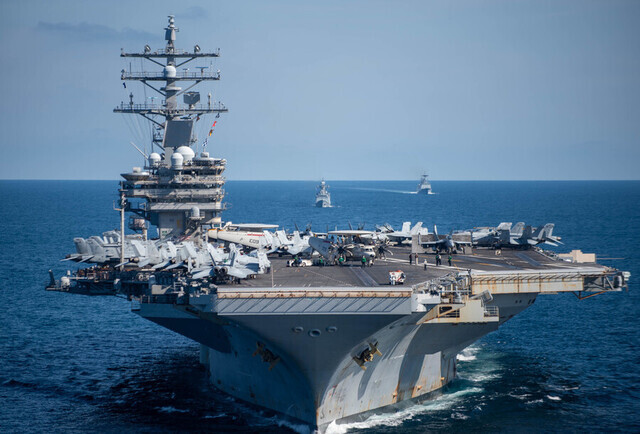hankyoreh
Links to other country sites 다른 나라 사이트 링크
[Editorial] How feasible is S. Korean ruling camp’s plan to bolster nuclear umbrella?

The conservative camp’s increasingly hard-line stance calling for nuclear armament and the redeployment of US tactical nuclear weapons to South Korea has been judged to be unrealistic.
Now, the government seems to be aiming to strengthen the US nuclear umbrella on the peninsula by increasing the deployment of US strategic assets to South Korea. However, this too may not be feasible.
When reporters asked President Yoon Suk-yeol on Thursday about a Chosun Ilbo report regarding a possible South Korea-US nuclear sharing agreement, the president said, “There are various opinions about extended deterrence in South Korea and in the US and we are carefully listening and meticulously considering different possibilities.”
Meanwhile, Vice Defense Minister Shin Beom-chul said in a radio interview that, rather than redeploying tactical nuclear weapons, the “most desirable” way to deter North Korea would be by “deploying currently available US strategic assets on the Korean Peninsula in a timely and coordinated manner.”
Shin drew a line when it came to discussing tactical nuclear weapons, citing the fact that the US National Security Strategy (NSS) released that same day by the White House included the “denuclearization of the Korean Peninsula” as a goal. “The US has no intention to redeploy tactical nuclear weapons [to South Korea],” Shin said.
Over the past few days, a sense of crisis has surged with repeated extreme remarks by key ruling party officials, such as Chung Jin-suk, head of the People Power Party’s emergency steering committee, who is calling for the scrapping of the inter-Korean joint denuclearization agreement and the relocation of US tactical nuclear weapons to South Korea.
However, the redeployment of tactical nuclear weapons directly goes against the principle of denuclearization of the Korean Peninsula, which is the basis for demanding North Korea’s denuclearization. Besides, having US tactical nuclear weapons on the Korean Peninsula could also lead to backlash from both China and Russia, and could even have a domino effect on the possible nuclearization of other regional actors, such as Japan and Taiwan.
The shift appears to be the South Korean government and presidential office’s attempt at damage control after the US exhibited reluctance toward redeploying tactical nukes since, ultimately, the decision-making power on the issue lies with Washington, not Seoul.
The government, which is emphasizing that it will “remarkably strengthen extended deterrence,” seems to be requesting “timely and coordinated deployment” of US strategic weapons, such as nuclear-powered aircraft carriers and nuclear-powered submarines.
The US, however, would determine the operation of its strategic weapons based not only on the North Korean threat but also based on its global strategy. Given this, it is unlikely that the US would accept a South Korean request to deploy strategic weapons whenever Seoul requires them.
Another issue is that, through this process, South Korea could end up becoming overly dependent on US support.
Meanwhile, on Wednesday, North Korea test-fired two long-range strategic cruise missiles involving units operating tactical nuclear weapons, greatly raising tension levels amidst its shows of nuclear force.
Doing everything possible to come up with realistic and meticulous security policies is not enough at a time when the security crisis continues to escalate.
It is extremely dangerous and irresponsible that the government and the ruling party are only pursuing unrealistic and hard-line views and are not seeking an off-ramp from this crisis at all.
Please direct questions or comments to [english@hani.co.kr]

Editorial・opinion
![[Editorial] Intensifying US-China rivalry means Seoul must address uncertainty with Beijing sooner than later [Editorial] Intensifying US-China rivalry means Seoul must address uncertainty with Beijing sooner than later](https://flexible.img.hani.co.kr/flexible/normal/500/300/imgdb/original/2024/0517/8117159322045222.jpg) [Editorial] Intensifying US-China rivalry means Seoul must address uncertainty with Beijing sooner than later
[Editorial] Intensifying US-China rivalry means Seoul must address uncertainty with Beijing sooner than later![[Column] When ‘fairness’ means hate and violence [Column] When ‘fairness’ means hate and violence](https://flexible.img.hani.co.kr/flexible/normal/500/300/imgdb/original/2024/0516/7417158465908824.jpg) [Column] When ‘fairness’ means hate and violence
[Column] When ‘fairness’ means hate and violence- [Editorial] Yoon must stop abusing authority to shield himself from investigation
- [Column] US troop withdrawal from Korea could be the Acheson Line all over
- [Column] How to win back readers who’ve turned to YouTube for news
- [Column] Welcome to the president’s pity party
- [Editorial] Korea must respond firmly to Japan’s attempt to usurp Line
- [Editorial] Transfers of prosecutors investigating Korea’s first lady send chilling message
- [Column] Will Seoul’s ties with Moscow really recover on their own?
- [Column] Samsung’s ‘lost decade’ and Lee Jae-yong’s mismatched chopsticks
Most viewed articles
- 1[Editorial] Transfers of prosecutors investigating Korea’s first lady send chilling message
- 2[Column] US troop withdrawal from Korea could be the Acheson Line all over
- 3[Exclusive] Unearthed memo suggests Gwangju Uprising missing may have been cremated
- 4[Editorial] Intensifying US-China rivalry means Seoul must address uncertainty with Beijing sooner t
- 5‘Shot, stabbed, piled on a truck’: Mystery of missing dead at Gwangju Prison
- 6Xi, Putin ‘oppose acts of military intimidation’ against N. Korea by US in joint statement
- 7China, Russia put foot down on US moves in Asia, ratchet up solidarity with N. Korea
- 8[Column] Welcome to the president’s pity party
- 9Constitutional Court declares act that denies unions by university professors is unconstitutional
- 10[Reporter’s notebook] What’s the secret behind BTS’ success?